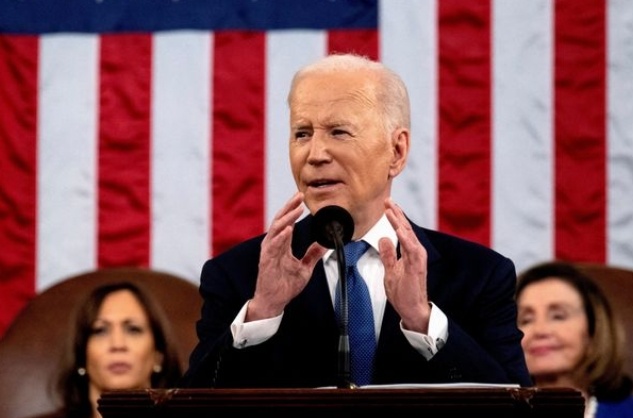President Joe Biden announced Tuesday that the U.S. will target “the main artery of Russia’s economy” by banning the import of Russian energy products.
“We’re banning all imports of Russian oil and gas and energy,” Biden said in remarks from the White House. “That means Russian oil will no longer be acceptable at U.S. ports and the American people will deal another powerful blow to Putin’s war machine.”
The president warned that the move would probably increase gas prices in the U.S., but that it was necessary to ramp up sanctions pressure on Russia’s economy for its war on Ukraine.
“Putin’s war is already hurting American families at the gas pump,” Biden said. “I’m going to do everything I can to minimize Putin’s price hike here at home.”
Biden’s language clearly anticipated a concerted Republican effort to blame him directly for the rise in gas prices, which hit a record in the U.S. on Tuesday. With gas prices certain to become a huge political issue in this year’s midterm elections, Biden devoted much of his remarks to focusing American anger directly on Putin, while also encouraging U.S. energy companies to produce more domestic oil.
The president said the U.S. had made the decision to ban Russian energy products “in close consultation” with allies around the world, particularly in Europe. He said many of those partners may not be able to take the same action.
“The United States produces far more oil domestically than all of Europe,” said Biden, who said the U.S. is a net exporter of energy. “We can take this step when others cannot, but we’re working closely with Europe and our partners to develop a long-term strategy to reduce their dependence on Russian energy as well.”
Afterward, Biden signed an executive order to ban the import of Russian oil, liquified natural gas and coal to the U.S., a senior administration official said. The order blocks any new purchases of those energy products and winds down the deliveries of existing purchases that have already been contracted for. The White House said the action also bans new U.S. investment in Russia’s energy sector and prohibits Americans from participating in foreign investments that flow into that sector in Russia.
The ban on new contracts begin immediately, and the administration is allowing a 45-day wind-down period for existing contracts, the official said.
The White House said the U.S. was able to take this step because of strong domestic energy production and infrastructure. Russian oil accounts for just under 10 percent of overall oil imports in the U.S., whereas it accounts for a third of imports in Europe, it said.
The official said Putin’s “unprovoked and brutal war has led to higher energy prices,” saying that gas prices have increased by about 75 percent since Russia began to mass troops at the Ukrainian border in November 2021.
Biden announces ban on Russian oil imports, calling it ‘Putin’s price hike’
Meanwhile, House Speaker Nancy Pelosi, D-Calif., told her caucus Tuesday afternoon that the House would vote later in the day on legislation to ban Russian oil, though Biden doesn’t need congressional action to move forward with the ban. The bill, which was still being written, was expected to go further than the president’s announcement.
Before Biden’s remarks, the United Kingdom’s business and energy secretary, Kwasi Kwarteng, announced his government would phase out the import of Russian oil and oil products by the end of 2022.
“This transition will give the market, businesses and supply chains more than enough time to replace Russian imports — which make up 8% of UK demand,” he said in a series of tweets. “Businesses should use this year to ensure a smooth transition so that consumers will not be affected.”
Earlier Tuesday, Shell announced it would immediately stop buying Russian crude oil and would withdraw from its involvement in all Russian hydrocarbons, including oil, natural gas and petroleum products, “in a phased manner.”
Members of Congress had been calling on the Biden administration to ban energy imports from Russia over its military invasion in Ukraine. A bipartisan group of lawmakers announced a deal Monday on a proposal to cut off those products.
Ukrainian officials had pressed for the U.S. to impose harsher sanctions on Russia, including on its energy products. Dmytro Kuleba, Ukraine’s foreign minister, wrote in a Washington Post op-ed article Monday that among other measures, “countries must stop buying Russian oil, which is now tainted with Ukrainian blood.”
The administration had been wary of sanctioning Russian oil because of already high gas prices.
White House press secretary Jen Psaki confirmed Monday that the administration had been speaking with Venezuela, a top ally of Russia in Latin America, about energy security and with Iran about oil. A White House official, however, shot down speculation that the U.S. was working with Saudi Arabia on oil imports, saying the characterization that engagement with that country is centered on oil was “simply wrong” and misunderstood “both the complexity of that issue as well as our multifaceted discussions with the Saudis from the President on down.”
European countries have been resistant to the prospect of banning Russian oil. German Chancellor Olaf Scholz said Monday that Europe deliberately exempted Russian energy supplies from sanctions because there is “currently no other way of securing Europe’s supply of energy for heat generation, for mobility, for power supply and for industry.”
Scholz said Germany has been working with its allies to develop alternatives to Russian energy, but that “doesn’t happen overnight.” He added, “It is therefore a conscious decision on our part to continue the activities of business enterprises in the field of energy supply with Russia.”
On Monday, British Prime Minister Boris Johnson said that it was “completely the right thing to do to move away from dependence on Russian hydrocarbons, but we have to do it step by step.”
“We have got to make sure we have substitute supply,” he said. “One of the things we are looking at is the possibility of using more of our own hydrocarbons.”
Dutch Prime Minister Mark Rutte also warned that if countries moved too quickly to ban Russian oil and gas, it could backfire with “enormous consequences.”
NBC




